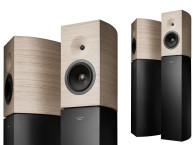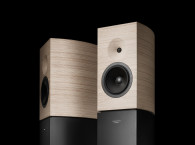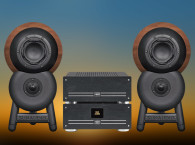
Amadeus first unveiled the Philharmonia Mini at the High End Music 2018 trade show in Munich, Germany, where they paired the passive speakers with a Grandioso C1 preamplifier and a Grandioso S1 amplifier, both from Esoteric, Japan, along with the NADAC digital-to-analog converter from Merging Technologies, Switzerland. The band-new passive speaker design is based on the Amadeus' top-of-the line Philharmonia powered speakers, which were initially created specifically for the Philharmonie de Paris recording and mastering studios. The new Philharmonia Mini speakers have a retail price of 36,000 Euros (VAT Incl.) in Europe.
"The sonic philosophy of the Philharmonia Mini is inherited from the initial model, Philharmonia, which has been our ultimate reference throughout the development process," explains Michel Deluc, Director of Research & Development for Amadeus.
The Philharmonia Mini was born from the prestigious legacy of Amadeus' success in the professional audio world over the last 25 years. Amadeus' users include great sound engineers, mixers and producers in France and throughout the world. "The original Philharmonia-first released in 2015 and created from our collaboration with Jean Nouvel and the Philharmonie de Paris-has touched, charmed, and surprised many music lovers over the last few years," adds Gaetan Byk, Marketing Manager at Amadeus.
"The Philharmonia Mini is a form of response by Amadeus and Jean Nouvel to requests from our customers, users, and partners from the consumer world. Extending the brand and therefore the Philharmonia range was necessary. We had to offer a more compact version, more discreet, less pricey and non-powered and not digitally-managed, incorporating a state-of-the-art passive filtering section, all without distorting the shape, finish and construction technique imagined by Jean Nouvel," states Byk.
The new Philharmonia Mini speaker design features a curved structure that is both simple and complex, consisting of 288 wood veneers accurately machined, aligned and glued, offering a distinctive look and volume. The speaker in itself (resonance volume) features a 432mm height with a 353mm depth. The cabinets are custom manufactured from layered Birch and stand 1.23 meters tall. The speaker enclosure features a unique hybrid laminar port using progressive termination inspired by the original Philharmonia. Machined into the wood material along the full height of the speaker system, the very low velocity port yields optimal linearity for the lowest possible distortion.

"The distinctive construction technique helps neutralize standing waves affecting sonic clarity and low-frequency definition through an extremely complex internal structure using a combination of interlocking panels arranged in two perpendicular planes, each hosting several tuned notch resonators. This allows a dramatic decrease in sound coloration through a crossed structure of longitudinal and trans-verse reinforcements," reveals Deluc.
The Philharmonia Mini 2-way, passive speakers feature the original Philharmonia' 28-mm soft-domed tweeter and a custom 170-mm woofer, for an amplitude linearity range (±2dB) from 54 Hz to 22 kHz, and a cut-off frequency (-6dB) of 44 Hz. The high-frequency driver features very low dielectric losses and high thermal conductivity, loaded behind a fast exponential waveguide machined in wood, which yields exceptional control over spatial dispersion.
The pedestal contains the passive components inside the lower part of the speaker enclosure, including the custom Amadeus-designed passive crossover. The outstanding sonic performance of the resistors, capacitors and inductors is achieved through a unique combination of advanced technologies, meticulously researched.
"This new model features a passive crossover built into the pedestal that allows the system to be driven by just one external amplifier. Achieving such a linear response without active components - and digital correction - created an enormous amount of work on the design of the enclosures' internal structure, the hybrid laminar port, and the waveguide expansion," states Deluc. "The passive filter design philosophy matches the aesthetic of the speaker. It is very minimalist. The passive crossover features a subtle combination of two different orders, inducing an absolutely perfect phase summation between the two speakers, and an excellent impulse response."

The rear panel of the pedestal features a pair of beautifully finished, top-quality binding posts from Japan-based manufacturer FURUTECH. These carbon-finished binding posts feature rhodium-plated conductors that are the result of meticulous engineering and careful auditioning of various suitable materials. The FT-816 features a pure copper conductor material for minimal impedance, extremely non-resonant carbon fiber, non-magnetic stainless steel, and eutectic copper alloy housings.
Selected specifications for the new Philharmonia Mini passive speakers:
Transducer (HF): Ø 28 mm soft dome
Transducer (LMF): Ø 170 mm bass driver
Recommended Power: 50 - 300W/8Ω
Amplitude linearity (±2dB): 54 Hz - 22 kHz
Cut-off frequency (-6dB): 44 Hz
Peak SPL 1-meter (Pair, IEC Short Term): 118 dB peak
Peak SPL 1-meter (IEC Short Term): 112 dB peak
Sensitivity (2.83V/1m): 90 dB
http://amadeusaudio.fr





